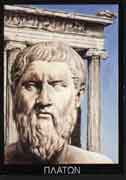.
 |
| Part of the series on: The Dialogues of Plato |
| Early dialogues: |
| Apology – Charmides – Crito |
| Euthyphro – First Alcibiades |
| Hippias Major – Hippias Minor |
| Ion – Laches – Lysis |
| Transitional & middle dialogues: |
| Cratylus – Euthydemus – Gorgias |
| Menexenus – Meno – Phaedo |
| Protagoras – Symposium |
| Later middle dialogues: |
| The Republic – Phaedrus |
| Parmenides – Theaetetus |
| Late dialogues: |
| Timaeus – Critias |
| The Sophist – The Statesman |
| Philebus – Laws |
| Of doubtful authenticity: |
| Clitophon – Epinomis |
| Epistles – Hipparchus |
| Minos – Rival Lovers |
| Second Alcibiades – Theages |
Protagoras is the title of one of Plato's dialogues.
The title refers to the main character Protagoras, a philosopher who belonged to the Sophists. In this dialogue, Plato places himself in opposition to the Sophists and their style of philosophical inquiry, which he believes favors disingenious words games over substantive and earnest thought.
The work consists of a discussion between Socrates and Protagoras, mainly dealing with the teachability of arete, or virtue. Protagoras argues that society is capable of instilling a sense of justice in the individual. This is achieved through instruction (as in schools) or punishment (as in prisons). He further argues that if an individual is aware of what is good and what is bad, they will never commit evil.
Plato tries to show that this is an overly simplistic notion, first by demonstrating the difficultly of defining arete and isolating it from similar, but not identical notions such as "courage" or "wisdom", and secondly by getting Protagoras to admit that people sometimes willingly commit bad or evil acts even if they are aware that they are wrong. He also advances an idea similar to Jeremy Bentham's Principle of Utility, arguing that true wisdom is the ability to accurately determine which actions will produce the greatest pleasure and the least pain and to act accordingly. Plato concludes that people commit evil acts because they lack the wisdom to assess their impact accurately.
Ultimately, Plato and Protagoras agree that arete is a form of knowledge or wisdom which is therefore capable of being taught, although they are in substantial disagreement about how to go about doing so.
| Ancient Greece
Science, Technology , Medicine , Warfare, , Biographies , Life , Cities/Places/Maps , Arts , Literature , Philosophy ,Olympics, Mythology , History , Images Medieval Greece / Byzantine Empire Science, Technology, Arts, , Warfare , Literature, Biographies, Icons, History Modern Greece Cities, Islands, Regions, Fauna/Flora ,Biographies , History , Warfare, Science/Technology, Literature, Music , Arts , Film/Actors , Sport , Fashion --- |
From Wikipedia, All text is available under the terms of the GNU Free Documentation License

